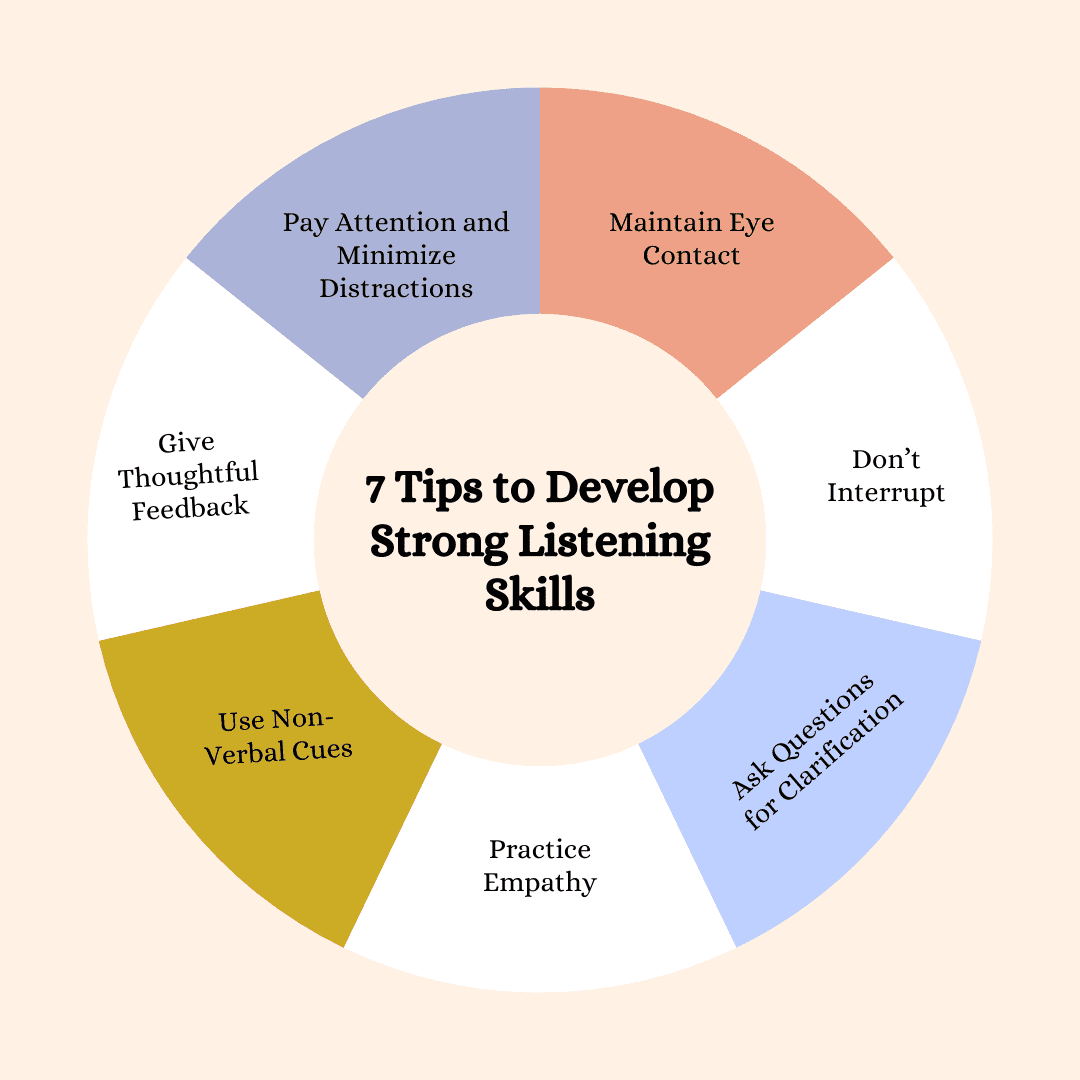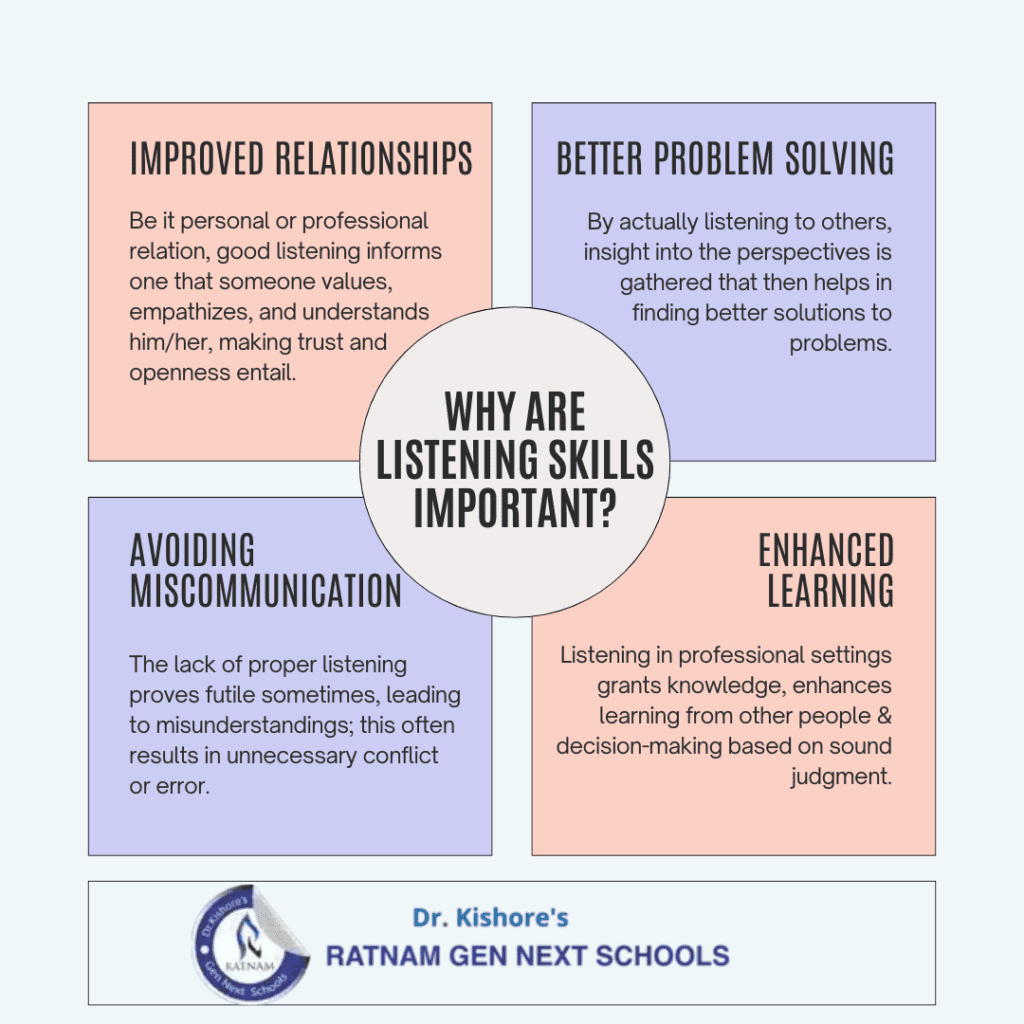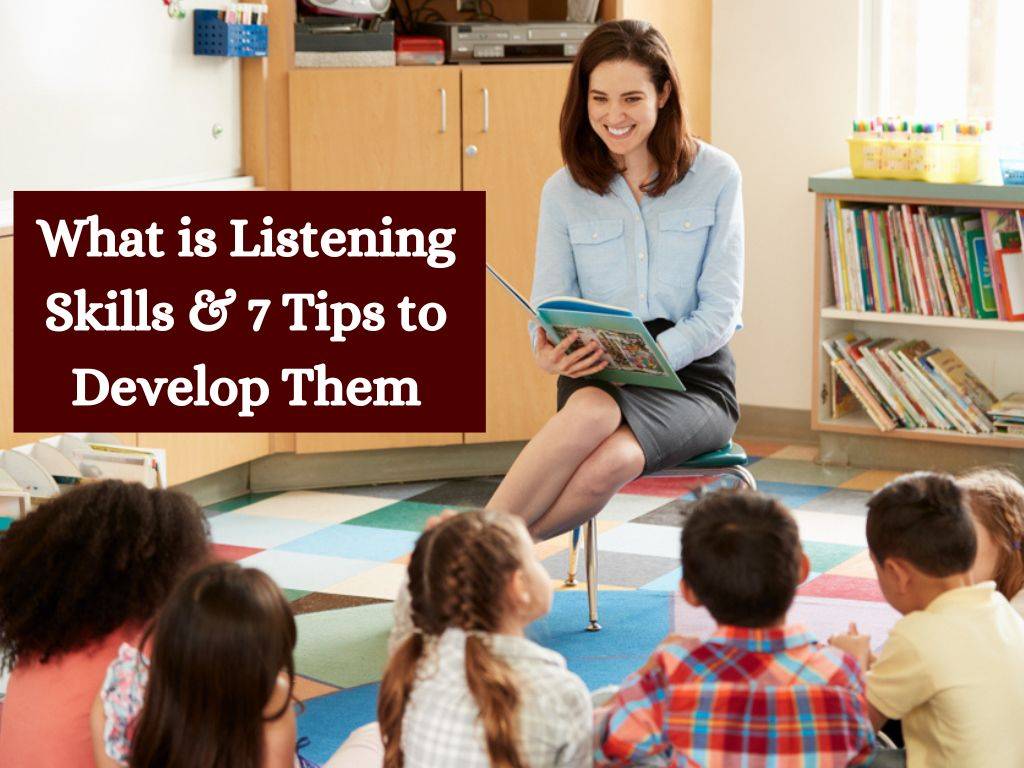In today’s world, over 100,000+ people find it hard to listen effectively. Since we are exposed to thousands of notifications, multitasking, and information overload, it becomes very easy to miss important points or misunderstand the message. At Dr. Kishore’s Ratnam Schools, we understand that fruitful interaction calls for strong listening skills, whether in personal relationships or at work.
We run the risk of misunderstanding, hurt feelings, and strained relationships when we don’t listen well in both settings-your workplace and personal life. Try to imagine missing important points of a work meeting or having an unpleasant conflict with a loved one because you were not really listening. Such situations lead to frustration, conflict, and lost opportunities in meaningful communications with other people.
Also Read: 10 Common Barriers to Effective Listening
The great thing is that listening is a skill you can develop. In this article, we will discover what skills listening really entails and present seven practical tips to help you develop these skills in order to become a more attentive and engaged listener .
What are Listening Skills?
Listening skills refer to what we employ to understand and interpret the sounds or messages received from others. Listening is thus very different from simply hearing words; it’s listening to get the full understanding of the message with emotions and intent that convey the meaning. At Dr. Kishore’s Ratnam Schools in Nellore, Tirupati, Kavali and Srikalahasti, good listening skills are considered a prerequisite in aiding connections among people and making informed decisions to avoid misunderstandings.
Listening generally falls into two broad categories:
1. Active Listening – Sometimes, people listen to the speaker in full heed and interest and then respond thoughtfully; active listening helps create trust and mutual comprehension between people.
2. Passive Listening – This is when someone hears the words but does not really absorb them. They may be distracted or just not interested, and that information may go out the window, or they may not get it.
Also Read: Outstanding Activities for Developing Listening Skills
The reality is that most of us switch between active and passive listening without realizing it. But to become better communicators, it’s essential to lean more towards active listening.

7 Tips to Improve & Develop Strong Listening Skills
By breaking up these minor habits into an array of great practices, you’ll soon find a difference in the quality of conversations.
1. Pay Attention and Minimize Distractions
The first good listening requires the attention of the speaker. Sounds simple, but pay close attention – not many of us have managed that lately, considering constant notifications and how we have built multitasking into our lives. Now, in Ratnam Schools affiliated with Dr. Kishore, students are motivated to work on minimizing distractions to focus better on lessons as well as interactions. Put the phone down and turn off unnecessary noise, then center on the conversation.
Also Read: How to Overcome & Reduce Exam Fear: 10 Tips
2. Maintain Eye Contact
Non-verbal communication is vital when trying to practice active listening. Maintaining eye contact is an indication that you are paying attention and listening to the person talking to you. It also makes them feel at ease and relaxed. You should not keep changing your gaze or look at your phone; you would appear nonchalant.
3. Don’t Interrupt
Interrupting someone who is speaking can quickly ring the death knell for effective communication. Wait until the speaker has finished, even if you believe you have a critical point to make. At Dr. Kishore’s Ratnam Schools, students are trained so that others can complete a thought before they respond, allowing for a healthy and constructive dialogue.
4. Ask Questions for Clarification
At times what’s said isn’t exactly clear and that’s fine. Don’t assume you know; instead, ask the speaker for clarification so you make sure you’re hearing what he really means to say. To illustrate, you can say, “Just to make sure I get the right idea, are you saying…?” This not only shows the speaker you are actively listening but also helps you avoid wrong assumptions.
5. Practice Empathy
Become a good listener by being empathetic. Try to see things from the other person’s point of view, as if you’re wearing his shoes. This doesn’t mean you have to agree with every word; it helps make an impression when you acknowledge their feelings or concerns. Use empathetic phrases such as “That sounds tough” or “I understand why you feel that way.” These will help the speaker know that someone has heard him.
6. Use Non-Verbal Cues
Good listening isn’t just about what you say but also how you physically respond. For instance, head nodding, smiling, or verbal acknowledgments such as “I see” or “I understand” can all demonstrate that you are paying attention and following his line of reasoning. These minor gestures make the speaker feel more at ease and assured enough to continue communicating.
7. Give Thoughtful Feedback
Take your time to react thoughtfully, not hastily. Some ideas for this might be a summarization of some key points that he or she has said and offering helpful feedback. For example, you could say, “It sounds like you’re feeling frustrated because…” This shows the speaker you were listening to and cares about the conversation.

Why are Listening Skills Important?
Having strong listening skills brings many benefits in life. At Dr. Kishore’s Ratnam Schools, we recognize that good listeners tend to excel in academics and beyond. Here’s why listening matters:
1. Improved Relationships
Be it personal or professional relation, good listening informs one that someone values, empathizes, and understands him/her, making trust and openness entail.
2. Better Problem Solving
By actually listening to others, insight into the perspectives is gathered that then helps in finding better solutions to problems.
3. Avoiding Miscommunication
The lack of proper listening proves futile sometimes, leading to misunderstandings; this often results in unnecessary conflict or error.
4. Enhanced Learning
Listening in professional settings grants knowledge, enhances learning from other people, and decision-making based on sound judgment.
Now that we understand why we should improve our listening skills, let’s see how with just a few practical tips.
Also Read: How to Overcome Mock Test Anxiety
Conclusion
Listening skills are actually a part of good communication but are consistently forgotten and relegated to the backseat. Being a good listener not only leads to good relationships but also good decisions and learning from others. As such, at Dr. Kishore’s Ratnam Schools, we believe in the power of listening in shaping future leaders. Thus, by paying attention, practicing empathy, and then giving thoughtful feedback, one can build up over time good listening skills. Remember that listening is not a skill which somebody just automatically possesses-hearing is one thing, and it is relatively easy, but listening is another, and it needs practice, patience, and an open mind!


